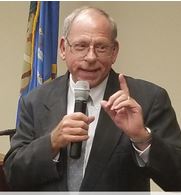Time to Lock the Clock
When I grew up on the farm, we had a neighbor who ran for a seat in the Oklahoma House of Representatives – the same seat that I would run for the next three times. In 1972 I helped him on his campaign, and in the course of doing so, discovered he did not change his clocks. It fit with his conservative philosophy as he questioned why the government made us go through this exercise. As he explained to me, the livestock on his farm did not change their clocks – they expected him to feed them at the same time each day, and not according to the new time on the clock.
The concept of Daylight Saving Time (DST) was first proposed by Benjamin Franklin in a 1784 satirical letter to the editor. He suggested that getting up earlier in the summer would save candle use in the evening. He even suggested ringing church bells to get people up earlier in the morning.
The federal government first implemented DST through the Standard Time Act of 1918, during the first World War. It was later resurrected during World War II. After the war, some jurisdictions continued to observe the wartime mandate. In 1966, the Uniform Time Act standardized the use of DST across the country, but allowed states to opt out and remain on Standard Time year-round. Permanent, or year-round DST was enacted in 1974, but Oklahoma and other states petitioned the federal government to repeal it because of problems caused by it being dark until after 8 a.m. in the winter. There were complaints of children going to school in the dark and employees going to work before the sun rose. So, the permanent act was repealed in 1975.
There appears to be a consensus that we should end the twice per year changing of the clocks. In addition to the frustration of changing clocks, most experts agree that the time changes adversely affect people’s health, especially relative to sleep. The body’s natural circadian rhythms are disrupted by the time changes, reducing the amount of high-quality, restful sleep. This in turn decreases cardiovascular health, increases diabetes and obesity, causes mental health issues, and lowers cognitive performance. Statistics show an increase in heart attacks, strokes, and traffic accidents in the days and weeks following the time changes.
And, as lighting has become more energy efficient, the energy savings has become negligent. In fact, any energy savings from lighting may be offset by increased air conditioning and household electronic usage resulting from people having extra daylight hours in the evening. So, the supposed main purpose is no longer valid.
Two approaches have been considered in Oklahoma Legislature. While both are intended to end the annual time changes, one would make DST permanent, while the other would keep us on Standard Time. But perhaps the more important factor is the ability to end the time changes now.
State Sen. Blake “Cowboy” Stephens (R-Tahlequah) filed Senate Bill 1200 to have us stay on DST year-round. He gained approval of a similar bill in the Senate last year, but action was not taken in the House. As a trigger law, SB 1200 would go into effect following the passage of the federal Sunshine Protection Act by Congress, and approval of the President. Nineteen states have already passed measures to automatically switch to permanent DST if the federal government enacts a bill to allow the states to do so.
The problem with this approach, is it requires federal action to make it happen. It is questionable if Congress will ever pass such a bill, and it also needs the support of the President to become law. While such a bill passed the Senate in March of 2022, it was by voice vote. Later many of the Senators claimed they did not realize they passed it. Perhaps they suffered from lower cognitive performance as the vote occurred just after a time change. It was never taken up in the House. As with much of what happens in Congress, it can’t be relied upon to get things done.
Meanwhile, state Rep. Kevin West (R-Moore) filed a legislative referendum, House Bill 2217, last year that would let the people vote on keeping Standard Time year-round. He held an interim study on the subject last October. West said he’s been asked why Standard Time and not DST year-round. West explains that the current federal law only allows states to exempt themselves from DST, and by default, remain on permanent Standard Time. So, Oklahoma can opt out of DST now and end the time change, but it cannot make DST permanent without federal action.
Currently we are required to move our clocks forward an hour at 2 a.m. the second Sunday of March each year and back an hour at 2 a.m. the first Sunday of November. On Sunday, March 10, it will be time to adjust our clocks to DST again. Oklahoma could end this disruptive practice now by opting out of DST. And, if Oklahomans want to switch to permanent DST, that could be put in place with Sen. Stephen’s bill, so that if the federal legislation ever passes, that could be accomplished instead. I don’t really care which time is adopted, but I want the time changes to end.
Ron McWhirter is one of the founders of the Oklahoma Constitution newspaper and serves as the General Manager. He may be contacted at the newspaper email: okconsti@aol.com










Latest Commentary
Thursday 30th of October 2025
Thursday 30th of October 2025
Thursday 30th of October 2025
Thursday 30th of October 2025
Thursday 30th of October 2025
Thursday 30th of October 2025
Thursday 30th of October 2025
Thursday 30th of October 2025
Thursday 30th of October 2025